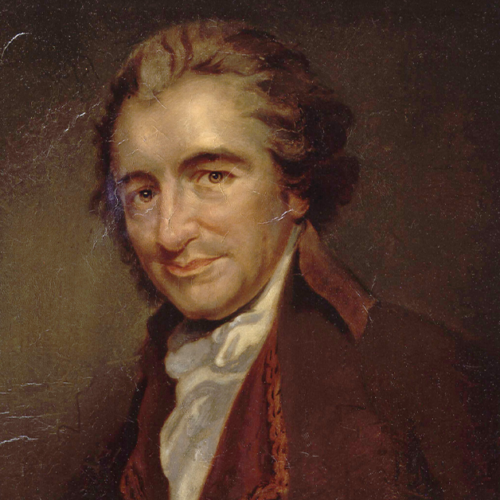

I believe in the equality of man; and I believe that religious duties consist in doing justice, loving mercy and endeavouring to make our fellow-creatures happy.
Thomas Paine
Thomas Paine was a writer, freethinker, and revolutionary, whose influence on radicals in 18th century England, France, and America was significant. His famous declaration in Rights of Man, ‘my country is the world and my religion is to do good,’ is a humanist one, and his powerful calls for freedom and equality for all anticipated the efforts of humanists up to the present day. Paine believed that ‘the most formidable weapon against errors of every kind is reason’, arguing for the rights of every individual to make use of it in deciding how best to live.
Paine was born in Thetford on 29 January 1737, the only son of a staymaker. He received an elementary education before entering his father’s trade. He tried various occupations before settling in Lewes as an exciseman, where he married a second time, his first wife having died just a year after their marriage.
In 1774 Paine became involved in an unsuccessful campaign for better pay for excisemen, which probably led to his dismissal, although the official reason was that he was absent from his post without permission. That year much else went wrong, including the failure of his marriage and a tobacco shop intended to supplement his income.
Paine moved to London – where he met Benjamin Franklin who, recognising his talents, encouraged him to emigrate to the American colonies on the eve of the American revolution. At this point Paine had only ever written one short pamphlet (supporting the excisemen’s claim for better pay), but in January 1776 he published Common Sense, a clarion call for independence which crystallised support for the American insurrection. As revolution gathered pace he published a series of pamphlets, entitled The American Crisis, designed to inspire Americans in their struggle with the British. In one the first use of the term ‘United States’ occurs.
By 1787 Paine was back in London, trying to promote his ideas on the use of iron for bridge building. But he was soon engrossed in the cause of the French Revolution, leading him to publish the two-part Rights of Man in 1791-2. This was a refutation of Edmund Burke’s counterrevolutionary blast, Reflections on the Revolution in France.
Reformers received Rights of Man with jubilation but the government moved to have it suppressed. Rights of Man is an appeal for the recognition of human rights, and a call for a compassionate society: ideals we would today describe as humanist. Central to his thesis was the belief that governments exist for the greater good the population at large and not that of monarchs. Paine was indicted for seditious libel but fled England to avoid trial.
Paine moved to France, having been granted honorary French citizenship in recognition of Rights of Man, and elected to the National Convention. Unfortunately Paine made an enemy of Robespierre by speaking up for Louis XVI when plans for his execution were afoot due to his opposition to capital punishment. He was arrested and imprisoned for 10 months, narrowly escaping the guillotine.
On his way to the Luxembourg prison Paine managed to pass the manuscript of The Age of Reason to a friend, who arranged for its publication. It comprised an analysis of biblical claims which, he argued, were false:
I do not believe in the creed professed by the Jewish church, by the Roman church, by the Greek church, by the Turkish church, by the Protestant church, nor by any church that I know of. My own mind is my own church.
Paine argued that revealed religion harms humanity and should therefore be rejected. He has often been falsely accused of being an atheist. He was a deist, but a fervent opponent of Christianity. The Age of Reason saw Paine create furious enemies and opponents. They were to besmirch his reputation, integrity and work in the following years.
Paine returned to the USA in 1802, but the final years of his life were sad. The role he had played in the American revolution was largely forgotten and his unbelief provoked dislike and opposition among the religious.
Thomas Paine died on June 8, 1809. Only six people attended his funeral. Today his best monument in the UK is in Thetford, where Sir Charles Wheeler’s statue has stood on King Street since 1964.
Through his writings Paine inspired many of the radicals and reformers who followed him. Many of his ideas were not new: they were found in the writings of Enlightenment philosophers such as John Locke, but Paine’s contribution was to popularise and explain them in terms ordinary people could understand and relate to. All that he wrote was imbued with the ideas of human liberty: freedom of belief; anti-slavery; democracy; human and women’s rights; the separation of religion from the state; and the idea that the state should serve the interests of ordinary people. All of these are central to the beliefs of humanists today, and were significant influences on many of those who shaped humanism in the UK.
Moncure Conway was inspired to write his 1892 Life of Thomas Paine partly by what he felt was a ‘sad absence of magnanimity among eminent historians and scholars in dealing with Paine’. Hypatia Bradlaugh Bonner amassed a large collection of materials relating to Paine’s life and works, now held by the Bishopsgate Institute.
By Robert Forder
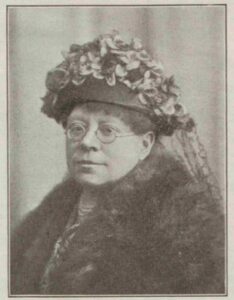
We hold that only by making happiness for those around us, and by endeavoring, individually, to make the world a […]
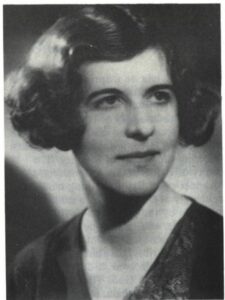
The actress turned campaigner and human rights activist Sylvia Scaffardi was a co-founder of The Council of Civil Liberties, along […]
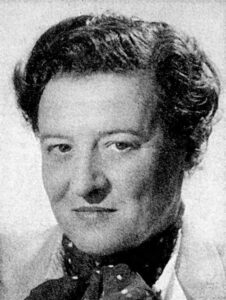
Now art, certainly literary art, is ‘existential’ and has to be so. It is, if nothing else, about the real […]
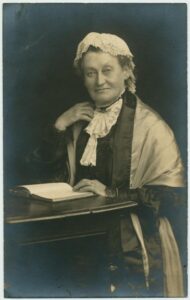
Dr Alice Vickery was a humanist, physician, and devoted champion of women’s reproductive rights. Her tombstone inscription remembers her as […]